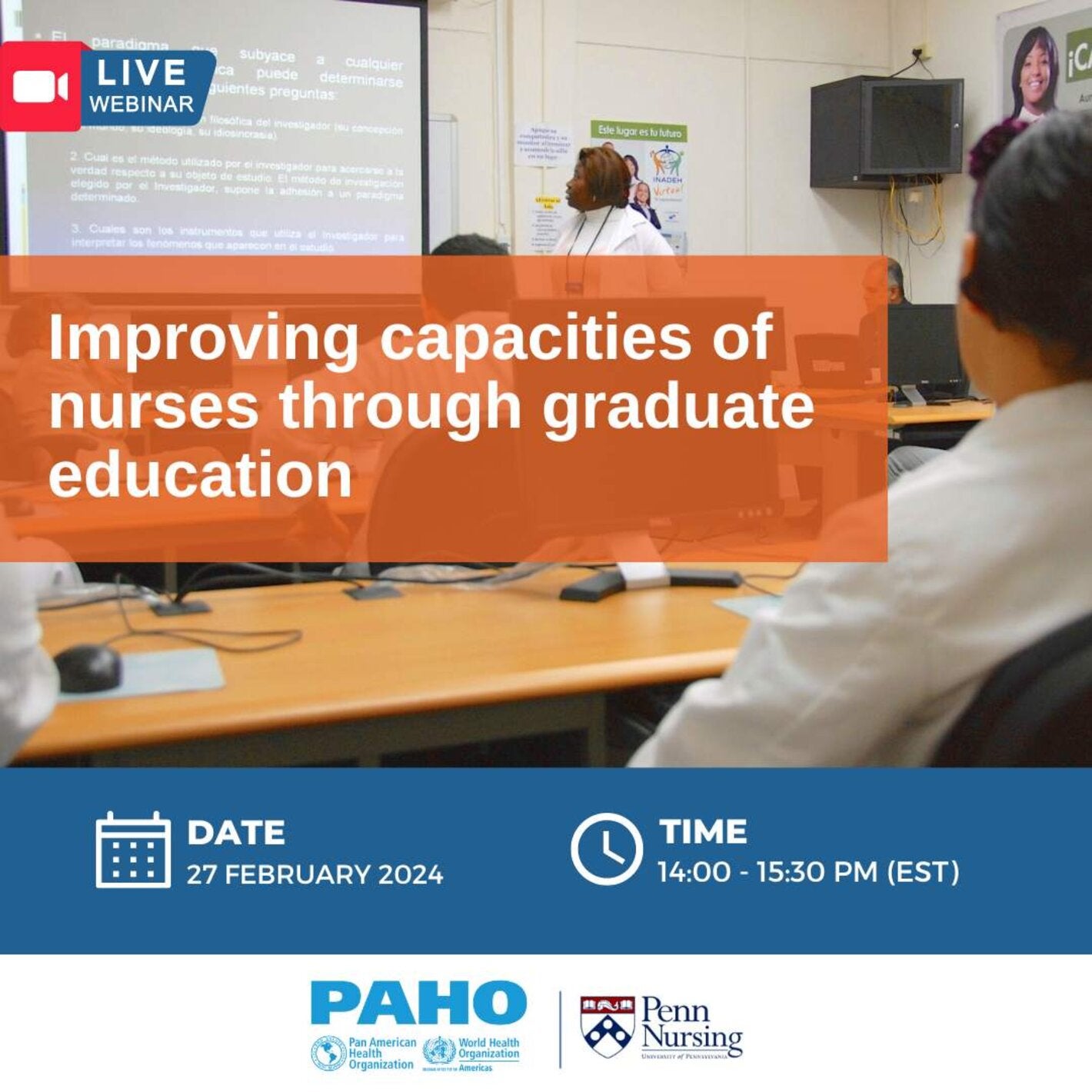
Join us on Tuesday, February 27th, from 2:00 to 3:30 pm (EST) on the webinar "Improving capacities of nurses through graduate education" organized by the Human Resources for Health Unit from the PAHO/WHO Department of Health Systems and Services, and the PAHO/WHO Collaborating Centre for Nursing and Midwifery Leadership, University of Pennsylvania, School of Nursing.
This event will discuss the opportunities, challenges, and strategies as well as the perspectives to advance the capacities of nurses through graduate education particularly in the Latin America and Caribbean countries.
How to participate
- Date: Tuesday, 27 February 2024
- Time: 2:00 - 3:30 pm (EST)
- Register here: https://paho-org.zoom.us/webinar/register/WN_nGjmhE6tTe6ZGj6IWmNKaA#/registratio
- Language: Simultaneous interpretation in English, Spanish, and Portuguese.
Introduction
The “Policy on the Health Workforce 2030: Strengthening Human Resources for Health to Achieve Resilient Health Systems”, approved by PAHO Member States in September 2023, highlights the need to enhance workforce capacity-building to address population health priorities and support public health emergency preparedness and response. Member States are expected to commit to strengthening the health workforce through education, research, and other investments.
Nursing education is an essential aspect of strengthening the capacity of the nursing workforce and advancing universal health and primary health care in the Region of the Americas. Transformative, competency-based, collaborative education programs are fundamental to qualify nurses to contribute to interprofessional teams within complex health systems, promote health and disease prevention, and address the social determinants of health.
The Region of the Americas has 2,540 schools of nursing. There are 63 doctoral training programs in Latin America and the Caribbean but 65% of which are in just one country, Brazil (1) (2). The number of nurses with graduate education: master and doctoral level is very low in this Region. The lack of prepared nurses with master and doctoral level impacts the quality of the education, the development of nursing research and science and the future of nursing. It also impacts the presence of nurses in leadership positions in the governments, academic settings or organizations and services.
Target Audience
- Ministries of Health and Education, university representatives, PAHO/WHO Collaborating Centers, nursing associations, public sector nurses, professionals, students, and other stakeholders.
Agenda
Moderator: Silvia Cassiani, Advisor, Nursing and Health Technicians, PAHO/WHO
- 2:00 pm- 2:10 pm - Opening Remarks
- Benjamin Puertas, Chief, Human Resources for Health Unit, PAHO/WHO
- 2:10 pm- 2:30 pm - Opportunities, strategies, and challenges for graduate training in Nursing in Latin America and the Caribbean – Doctoral Training Survey
- Antonia Villarruel and Margo Brooks Carthon, PAHO/WHO Collaborating Centre for Nursing and Midwifery Leadership, School of Nursing, University of Pennsylvania, USA
- 2:30 pm-3:00 pm - Impact of graduate training on strengthening the skills of nurses in Latin America and the Caribbean
- Nelcy Martínez Trujillo, National School of Public Health, Cuba
- María Liliana Calderón Macias, Southern State University of Manabí, Ecuador
- Dawn A. Munroe, PAHO/WHO Collaborating Centre for Nursing and Midwifery Development in the Caribbean, The University of the West Indies School of Nursing, Jamaica
- 3:00 pm-3:30 pm - Closing remarks
References
(1) Pan American Health Organization. The Strategic Importance of National Investment in Nursing Professionals in the Region of the Americas. Washington, D.C., PAHO, 2022 (https://iris.paho.org/handle/10665.2/55957).
(2) Pan American Health Organization. Nursing in the Region of the Americas – 2023. Washington, D.C., PAHO, 2023 (https://www.paho.org/en/topics/nursing/nursing-region-americas-2023).
